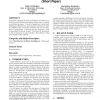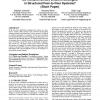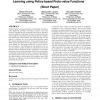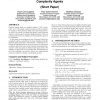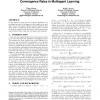93
Voted
ATAL
2008
Springer
15 years 2 months ago
2008
Springer
In this paper we investigate two related aspects of the formalization of open interaction systems: how to specify norms, and how to enforce them by means of sanctions. The problem...
96
Voted
ATAL
2008
Springer
15 years 2 months ago
2008
Springer
This paper addresses the issue of emergence of robust cooperation among self-interested agents interacting in N-player social dilemma games. A series of graphs are created each ex...
ATAL
2008
Springer
15 years 2 months ago
2008
Springer
Reports of applications that include agent-based models of human behaviour tend to focus on the applications themselves and the success of the modelling exercise. They give little...
92
Voted
ATAL
2008
Springer
15 years 2 months ago
2008
Springer
In the last years, distributed coordinator-free systems, e.g., peerto-peer systems (P2P systems), have attracted much interest among researchers and practitioners. In these system...
54
Voted
ATAL
2008
Springer
15 years 2 months ago
2008
Springer
103
Voted
ATAL
2008
Springer
15 years 2 months ago
2008
Springer
Auction methods have been successfully used for coordinating teams of robots in the multi-robot routing problem, a representative domain for multi-agent coordination. Solutions to...
108
click to vote
ATAL
2008
Springer
15 years 2 months ago
2008
Springer
Reinforcement Learning research is traditionally devoted to solve single-task problems. Therefore, anytime a new task is faced, learning must be restarted from scratch. Recently, ...
87
Voted
ATAL
2008
Springer
15 years 2 months ago
2008
Springer
Physical agents (such as wheeled vehicles, UAVs, hovercraft, etc.) with simple control systems are often sensitive to changes in their physical design and control parameters. As s...
106
click to vote
ATAL
2008
Springer
15 years 2 months ago
2008
Springer
In this paper we study the use of experts algorithms in a multiagent setting. In this paper we allow agents to use multiple experts and explore different experts algorithms that a...
82
Voted
ATAL
2008
Springer
15 years 2 months ago
2008
Springer
When the same set of people interact frequently with one another, they grow to think more and more along the same lines, a phenomenon we call "collective cognitive convergenc...

